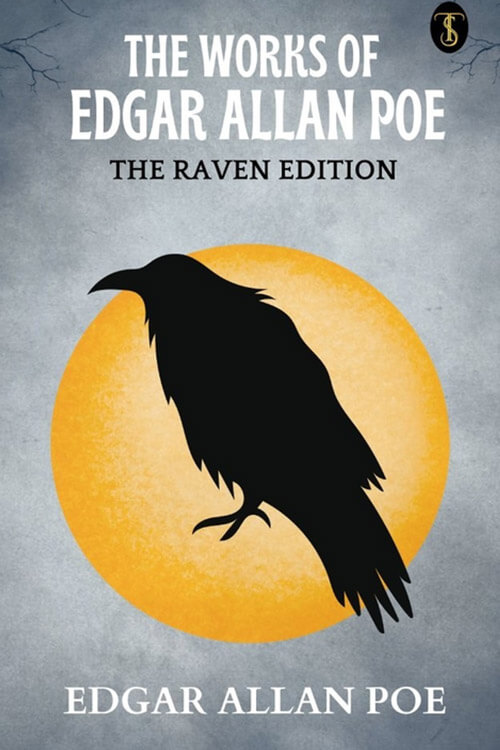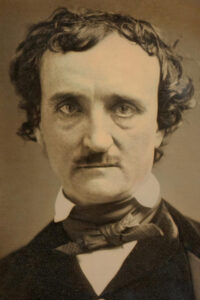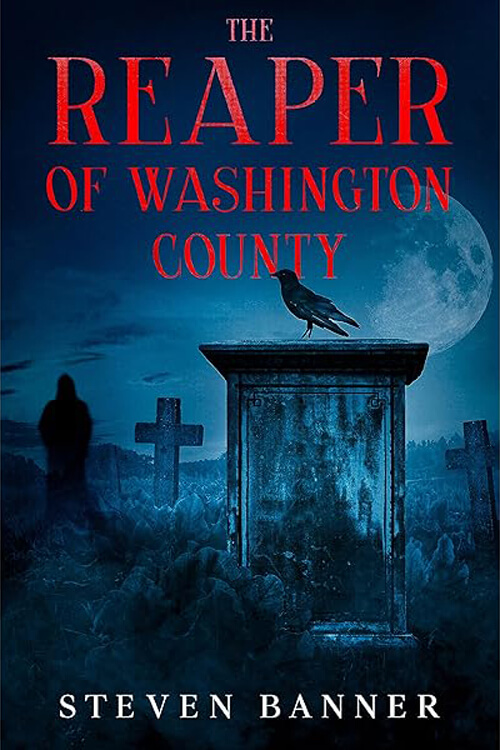
Collected Works of Poe
Remarkable experiences are usually confined to the inner life of imaginative men, but Mr. Poe’s biography displays a vicissitude and peculiarity of interest that is rarely met. The offspring of a romantic marriage and left an orphan at an early age, he was adopted by Mr Allan, a wealthy Virginian, whose barren marriage bed seemed the warranty of a large estate to the young poet. Having received a classical education in England, he returned home. He entered the University of Virginia, where, after an extravagant course followed by reformation at the last extremity, he graduated with the highest honours of his class. Then came a boyish attempt to join the fortunes of the insurgent Greeks, which ended at St. Petersburg, where he got into difficulties through want of a passport, from which he was rescued by the American consul and sent home. He now entered the military academy at West Point, from which he obtained a dismissal on hearing of the birth of a son to his adopted father by a second marriage. This event cut off his expectations as an heir.
The death of Mr. Allan, in whose will his name was not mentioned, soon after relieved him of all doubt in this regard, and he committed himself at once to authorship for support. Previously, however, he had published (in 1827) a small volume of poems, which soon ran through three editions and excited high expectations of its author’s future distinction in the minds of many competent judges. I am unsure that prophecy can be drawn from a poet’s earliest lispings, but there are enough instances to prove it. Shakespeare’s first poems, though brimful of vigour, youth, and picturesqueness, give a very faint promise of the directness, condensation, and overflowing moral of his maturer works. Perhaps, however, Shakespeare is hardly a case in point, his “Venus and Adonis” having been published, we believe, in his twenty-sixth year. Milton’s Latin verses show tenderness, a fine eye for nature, and a delicate appreciation of classic models but give no hint of the author of a new style in poetry. Pope’s youthful pieces have all the sing-song, wholly unrelieved by his later productions’ glittering malignity and eloquent irreligion. Collins’ callow namby-pamby died and showed no sign of the vigorous and original genius he afterwards displayed. We have never thought that the world lost more in the “marvellous boy,” Chatterton, than a very ingenious imitator of obscure and antiquated dullness. When he becomes original (as it is called), the interest in ingenuity ceases, and he becomes stupid. Mr. Southey’s respectable name endorsed Kirke White’s promises…
Read or download Book
Edgar Allan Poe
Edgar Allan Poe (né Edgar Poe; January 19, 1809 – October 7, 1849) was an American writer, poet, author, editor, and literary critic best known for his poetry and short stories, particularly his mystery and macabre tales.
Biography
He is central in Romanticism and Gothic fiction in the United States and American literature. Poe was one of the country’s earliest practitioners of the short story and is considered the inventor of the detective fiction genre and a significant contributor to the emerging science fiction genre. He is the first well-known American writer to earn a living by writing alone, which resulted in a financially difficult life and career. Poe was born in Boston and was the second child of actors David and Elizabeth “Eliza” Poe. His father abandoned the family in 1810, and when his mother died the following year, Poe was taken in by John and Frances Allan of Richmond, Virginia. They never formally adopted him, but he was with them well into young adulthood. He attended the University of Virginia but left after a year due to a lack of money.
He quarrelled with John Allan over his education funds and gambling debts. In 1827, having enlisted in the United States Army under an assumed name, he published his first collection, Tamerlane and Other Poems, credited only to “a Bostonian”. Poe and Allan reached a temporary rapprochement after the death of Allan’s wife in 1829. Poe later failed as an officer cadet at West Point, declared a firm wish to be a poet and writer, and parted ways with Allan. Poe switched his focus to prose and spent the next several years working for literary journals and periodicals, becoming known for his style of literary criticism. His work forced him to move between several cities, including Baltimore, Philadelphia, and New York City. In 1836, he married his 13-year-old cousin, Virginia Clemm, but she died of tuberculosis in 1847. In January 1845, he published his poem “The Raven” to instant success.
He planned for years to produce his journal, The Penn, later renamed The Stylus. But before it began publishing, Poe died in Baltimore in 1849, aged 40, under mysterious circumstances. The cause of his death remains unknown and has been variously attributed to many causes, including disease, alcoholism, substance abuse, and suicide. Poe and his works influenced literature worldwide and specialized fields such as cosmology and cryptography. His work appears throughout popular culture in literature, music, films, and television. A number of his homes are dedicated museums. The Mystery Writers of America presents an annual Edgar Award for distinguished work in the mystery genre.






